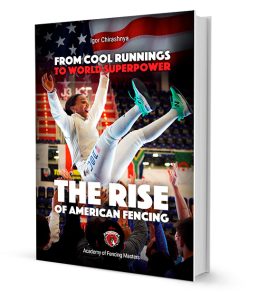 Though it can be extremely frustrating, it’s important to realize that every fencer progresses at their own pace. Though they can have the same coaches, the same lessons, the same amount of practice, and sometimes even the same parents, nonetheless fencers progress at their very own pace. There’s no way to absolutely speed up the process.
Though it can be extremely frustrating, it’s important to realize that every fencer progresses at their own pace. Though they can have the same coaches, the same lessons, the same amount of practice, and sometimes even the same parents, nonetheless fencers progress at their very own pace. There’s no way to absolutely speed up the process.
Nature vs. Nurture in Fencing
A hot topic of debate in both sport and in life is the issue of nature vs. nurture. In fact, it’s often said to be one of those “unanswerable” questions in the world. It’s an issue that extends to everything in life, from careers, to learning a musical instrument, to painting, etc. The debate has gone on for decades and longer – whether human accomplishment is determined by our DNA or by our life experiences.
Are great fencers born, or are they made?
That’s the heart of the matter as to why some fencers progress more quickly than others, even given the same training, the same time, the same equipment, etc. In our experience, the answer is actually really straightforward – great fencers are both born and they are made.
Natural ability absolutely has a hand in how fast a fencer progresses. Some fencers, due to early childhood experiences, natural physical characteristics, or innate mental propensities, have an edge.
In fact, sports science hasn’t fully fleshed out what exactly is the driving force behind performance. In any sport, there’s a whole range of psychological, physiological, and environmental factors in the performance of every sport. Every person reacts differently to training and practice, to competition and hard work. There’s nothing that says that everyone goes at the same rate, nor would we want them to!
One thing that sports performance science does tell us is that elite athletes, including elite fencers, are those individuals who put in consistent hard work. No matter the underlying physical or psychological individualities, a common denominator that looms over training quality, over coaches, over opponents, over everything, is the hard work that goes into getting better.
An Individual Sport with an Individual Progression
Fencing is an individual sport, which means that the talents of a fencer are on showcase during every single bout. However it’s important to note that because fencing requires an opponent, it’s a bit more complex than individual sports like swimming or track, which offer no solid opponent. You can run a race a get your time without an opponent there on the track – you cannot fence a match without another fencer.
The environment surrounding a fencer matters a lot, and factors such as fencing club and its’ competitiveness, teammates, coaches, parents, competitions, availability of specialty clinics and camps, and so on, play a huge role.
Sometime the reason that fencers in the same program, taking the same number of private lessons with the same coach might be experiencing different levels of success is that for whatever reason that coach might not be just right for them. It’s all about getting that right fit.
Focus matters for progression
Another key thing to remember is that different fencers have a different level of focus. For instance, if you have two fencers in the same classes, in the same private lessons, doing the same amount of practice, but they’re progressing differently, then it might have something to do with their ability to focus effectively during that time.
There’s a reality that not every fencer has the same things going on outside of the club. One student might be in the midst of a rigorous school program that requires a lot of attention and draws focus away from lessons, even though they’re physically there. Another might be struggling with their desire to be in fencing at all, pulled on by other extra-curricular activities and so they don’t have the brain space to give to fencing that another fencer might.
Fencing parents especially need to understand that giving a young fencer the space to concentrate on their fencing is important. Though you’re taking the same lessons, have the same weapon, etc. it doesn’t matter. Giving a young fencer the room to focus and attend to their fencing makes heaps of difference in their ability to learn and perform well.
Passion can’t be forced
The last piece that we can’t neglect to mention is that special spark, that passion that makes each fencer unique.
We all hope to find something in our lives that tickles our fancy, that excites us to our core. Some fencers become so enthralled with the sport that they throw themselves into it. When that perfect match is made between athlete and sport, it makes everything come together. That’s not to say that someone who doesn’t have a deep spark for fencing can’t excel at it – quite the opposite, they can still learn a great deal and grow in the sport!
However it’s worth noting that some fencers take off within the sport because it’s just that perfect fit. And while passion can’t be forced, sticking with fencing through those hard times can grow passion and allow it to blossom in a fencer who might have otherwise been lukewarm. Encourage your fencer to stick with the sport through a season to allow themselves to see if it’s their sport!
Fencing is not a race!!
Fencing isn’t a race! It’s so, so important for fencers to realize that progressing in different ways doesn’t mean that one fencer is better or more valuable than another. It doesn’t mean that they’ll end up in the same place down the road. EVERYONE gets to their best in time.
Think of fencing progress as an uphill climb. People can take breaks at different times. They tackle tough parts with different strategies. Does it matter as long as they’re still making progress? Of course it doesn’t!
For us, fencing isn’t about winning matches. The best fencer is the fencer who is better than they were at the last practice. Continued forward motion is all that matters – regardless of what anyone else is doing. One step at a time, one lesson at a time, one bout at a time. The competition is never between one fencer and another – it’s between each individual fencer and themselves.
It is so, so tempting for fencers or fencing parents to compare one fencer to another. However all this does is to take focus away from the individual’s progression in fencing. The more time you’re spending worrying about whether a teammate is getting better too fast or too slow means that there’s less time for you to focus on your own fencing.
Stick with fencing despite challenges
You can absolutely encourage a child to stick with it through the natural ups and downs of their progression as fencers. That ability to stay with something through difficulties and plateaus is a skill that’s not only great for fencing, but great for life!
Comparing one fencer to another fencer is something that should be discouraged by fencing parents, coaches, teammates, etc. Every fencer goes at their own pace. Your fencer might be struggling today, only to have a breakthrough next week that propels them forward in their skill. You never know when those “Aha!” moments are going to come in fencing. Pushing forward towards that end goal of progress allows for growth that just can’t happen otherwise.
Looking at the overarching scope of improvement helps fencers to see that, for the most part, fencers all get there in time! It’s not about who’s doing well today or tomorrow, but about what kind of overarching growth is being seen.
Every fencer progresses differently, no matter that they’re in the same classes, have the same weapon, and are of similar physical prowess. Being understanding of natural differences means that you can take the focus away from other fencers and put it back on yours!




0 Comments
Trackbacks/Pingbacks